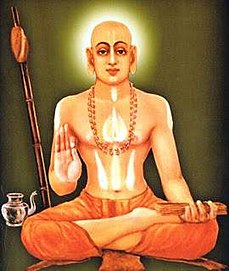Satyadharma Tirtha
Satyadharma Tirtha (c. 1743 - c. 1830),[2] was a Hindu philosopher, scholar, theologian and saint belonging to the Dvaita order of Vedanta. He was the 28th pontiff of Uttaradi Math since Madhvacharya from 1797-1830.[3]
Sri Satyadharma Tirtha | |
|---|---|
| Personal | |
| Born | Navaratna Purushottamacharya 1743 |
| Died | 1830 |
| Religion | Hinduism |
| Order | Vedanta (Uttaradi Math) |
| Philosophy | Dvaita Vedanta |
| Religious career | |
| Guru | Satyavara Tirtha (Ashrama Guru) Satyabodha Tirtha (Vidya Guru) |
| Predecessor | Satyavara Tirtha |
| Successor | Śrī Satya-saṅkalpa Tīrtha |
Disciples
| |
| Part of a series on |
| Dvaita |
|---|
 |
|
Literature
|
|
|
Holy places |
| Hinduism portal |
Life
Satyadharma Tirtha was born in 1743 in Savanur, Haveri district, Karnataka. His purvashrama name was Navaratna Purushottamacharya.[2] He belongs to Navaratna family of scholars, who belongs to Deshastha Madhwa Brahmin family.[4][5] Satyadharma Tirtha was a contemporary of Dewan Purnaiah.[6]
Works
There have been 27 works accredited to Satyadharma Tirtha, 10 of which are commentaries on the works of Hindu philosopher's of Dvaita order, especially Jayatirtha.[1][7][8][9]
| Name | Description |
|---|---|
| Tattvasaṁkhyāna Tippani | Summary of Tattvasaṁkhyā of Jayatirtha |
| Namaka Chamaka Vyakhyana | Gloss on Namaka Chamaka |
| Shreemadbhagavata Tippani | Summary of Bhagavata Tatparya Nirnaya of Madhvacharya |
| Viratparva Tippani | Summary of Virata Parva of Mahabharata |
| Udyoga Parva Tippani | Summary of Udyoga Parva of Mahabharata |
| Ramayana Tippani | A gloss on "Valmiki Ramayana" |
| Virahimodasudhavyakhyan | Gloss on Virahimoda Sudha |
| Tarangini Shloka Vyakhya | Gloss on Tarangini Shloka |
| Vishnutatvanirnaya Teeka tippani | Commentary on Jayatirtha's Viṣṇutattvanirṇayaṭikā |
| Bhasyadipika yukti vaatya | A reputation of Bhasyadipika of Jagannatha Tirtha |
| Gangalahari | A hymn in praise of Ganga |
| Sri Lakshminarashimastotram | A hymn in praise of Lord Lakshmi Narasimha |
| Nithyasamsarilingabhanga Vichara | A theological tract refuting a schismatic view that even the class of "Nitya Samsari" souls have to undergo destruction of their "Linga-deha" |
| Navagraha Stotram | A short hymn on Navagraha |
| Sri Vadiraj Stotram | A hymn in praise of Vadiraja Tirtha |
| Sri Satyavara Stotram | A hymn in praise of his guru Satyavara Tirtha |
Miscellaneous works:
- Kavikanthamani
- Yaduvaracharitamruta Lahari
- Bhagavadbhajanam
- Hitopadesha
- Sri Rangeshwara Srungaralahari
- Geetamatmyasarasangraha
- Antrlapikah
- Barirlapikah
- Gurvashtakam
gollark: They are not really identical to non-transgender people of the same gender in some important ways.
gollark: What's meant to be *positive* bias?
gollark: That also has a ton of connotations.
gollark: ***Ë***
gollark: We should all aim to be more correct™.
References
- Sharma 2000, p. 512.
- Rajaram 2019, p. 447.
- Raghavan 1975, p. 513.
- Sharma 2000, p. 653.
- Rajaram 2019, p. 18.
- Rajaram 2019, p. 300.
- Sharma 2000, p. xxvi.
- Sharma 2000, p. 547.
- Sharma 2000, p. 457.
Bibliography
- Rajaram, N S (2019). The Vanished Raj A Memoir of Princely India. Prism Books Private Limited. ISBN 978-9388478113.CS1 maint: ref=harv (link)
- Sharma, B. N. Krishnamurti (2000). A History of the Dvaita School of Vedānta and Its Literature, Vol 1. 3rd Edition. Motilal Banarsidass (2008 Reprint). ISBN 978-8120815759.CS1 maint: ref=harv (link)
- Raghavan, V. (1975). International Sanskrit Conference, Volume 1, Part 1. The Ministry.CS1 maint: ref=harv (link)
- Rao, C. R. (1984). Srimat Uttaradi Mutt: Moola Maha Samsthana of Srimadjagadguru Madhvacharya.CS1 maint: ref=harv (link)
- Krishna, Daya (2002). Developments in Indian philosophy from Eighteenth century onwards: classical and western. Project of History of Indian Science, Philosophy, and Culture.CS1 maint: ref=harv (link)
External links
This article is issued from Wikipedia. The text is licensed under Creative Commons - Attribution - Sharealike. Additional terms may apply for the media files.